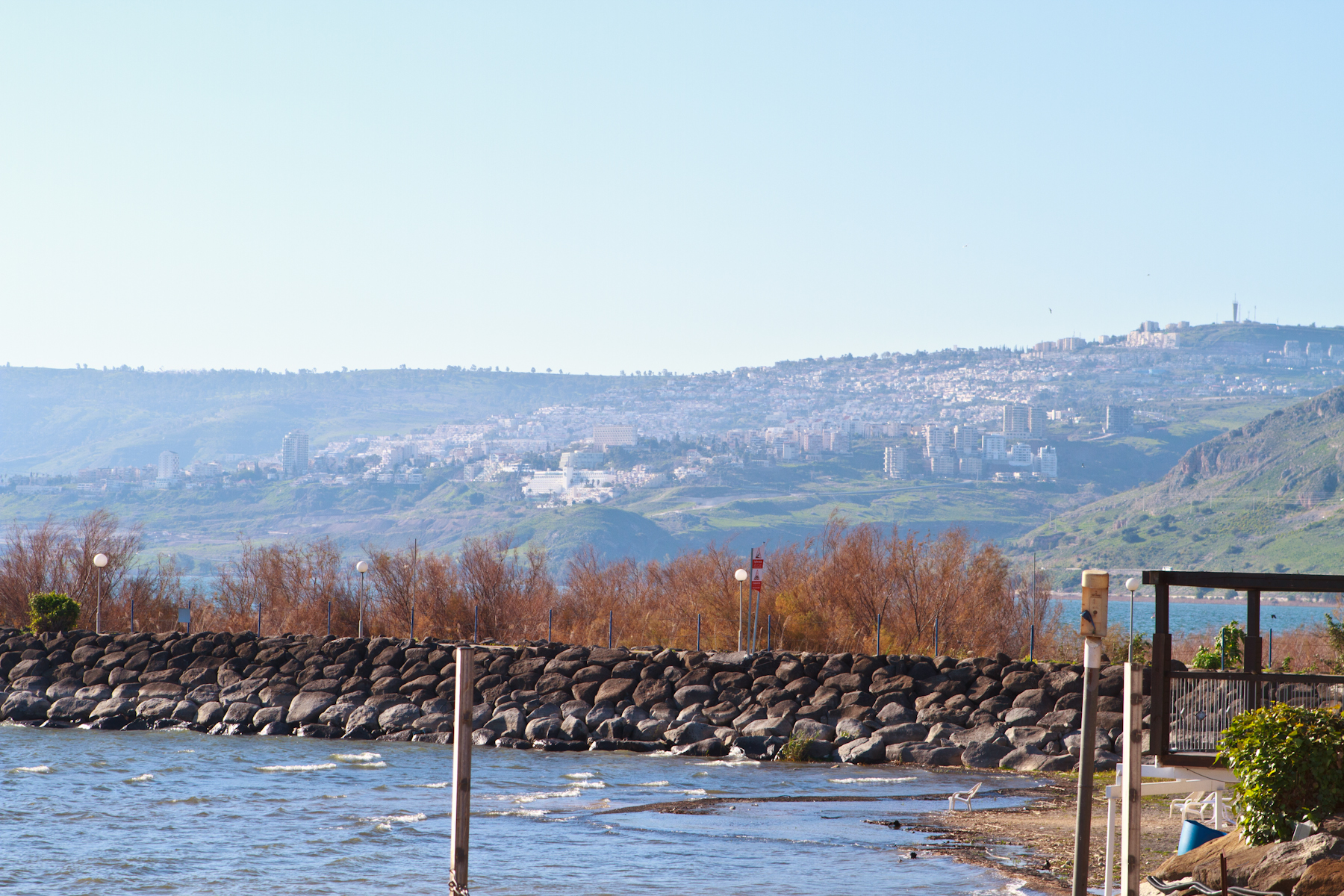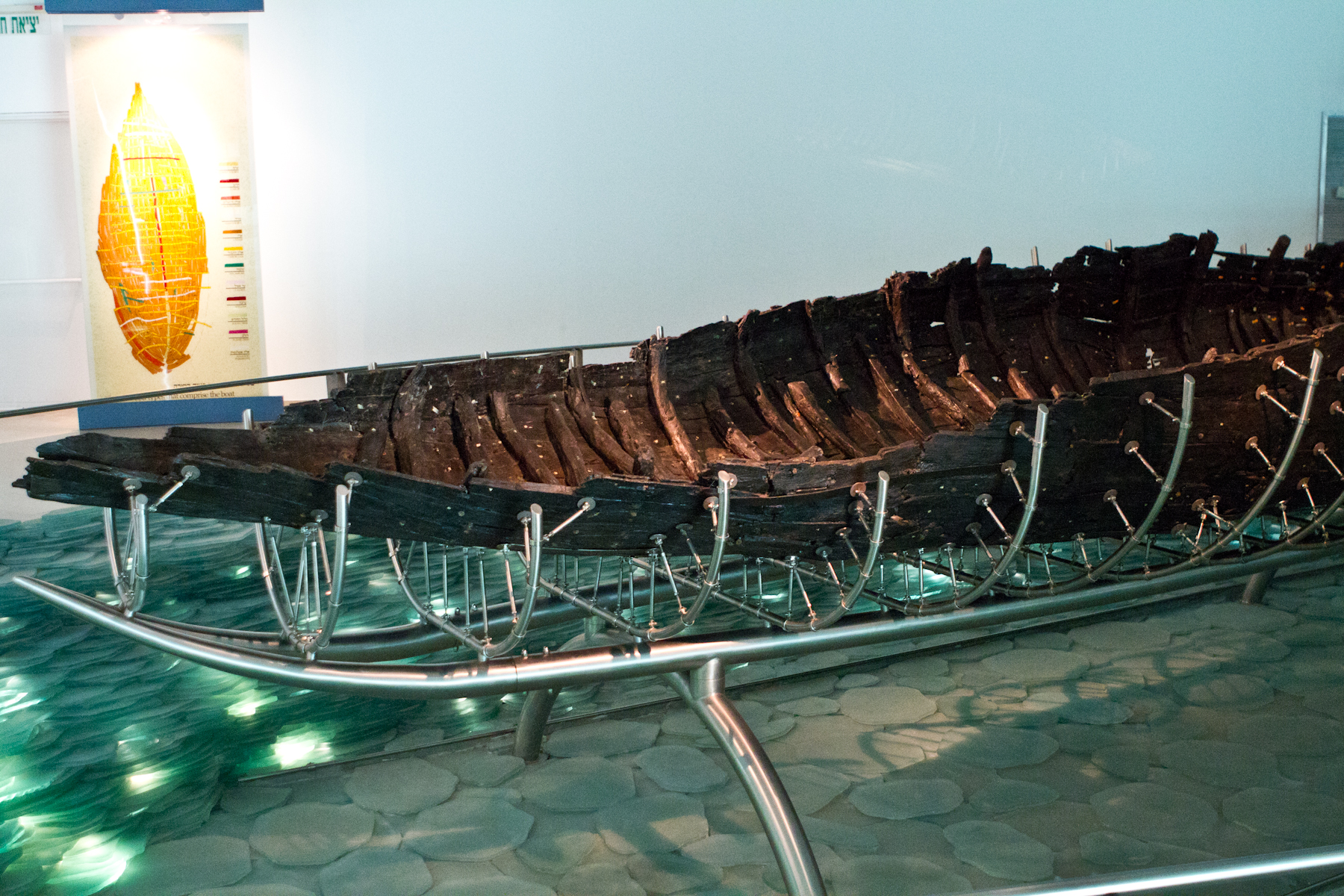I awakened refreshed after 10 hours of good sleep and walked down to the shore of the Sea of Galilee. It was beautiful, surrounded by marshy areas alive with reeds and elongated green plants.  After breakfast, we walked over to the “Jesus Boat”—an amazingly preserved First-Century fishing boat of exactly the sort Jesus and his disciples would have used. It was found in buried in the mud and sand of the shore of the Sea of Galilee in the 1980s, and has been preserved by pouring a type of plastic into the places where water once had been. The cause of its sinking is unclear: was it sunk in a storm? Perhaps it was one of the fishing boats used in the naval battle of Magdala against the Romans during the rebellion in the late 60s CE.
After breakfast, we walked over to the “Jesus Boat”—an amazingly preserved First-Century fishing boat of exactly the sort Jesus and his disciples would have used. It was found in buried in the mud and sand of the shore of the Sea of Galilee in the 1980s, and has been preserved by pouring a type of plastic into the places where water once had been. The cause of its sinking is unclear: was it sunk in a storm? Perhaps it was one of the fishing boats used in the naval battle of Magdala against the Romans during the rebellion in the late 60s CE.
We took a wonderful wooden first-century styled boat on a brief ride on the Galilee, where we sang “Dear Lord and Father of Mankind,” the Navy hymn, which always reminds me of so many funerals I did of retired Navy folks and their wives when I was at Bethesda.
This was the first of a couple of days we spent almost entirely in tourist mode. Our next trip was to Capernaum, Jesus’ adult home. While I’ve been there before, it’s not something to grow tired of. The site that is traditionally held to be Jesus’ house, where he lived with Peter and his family, is right next to the synagogue. Crossan and Borg have written that the site held to be Peter’s house is almost certainly the place, because the earliest strata reveal evidence that from the mid or late first century the house was considered holy and was a place of worship—a domos ecclesia, or house church. The synagogue has been built up multiple times, but this was likely the place where Jesus preached and was confronted with the man with a demon; and it’s right next door to Peter’s house. Amazing.
We travelled toward Jerusalem, stopping at the site of a major battle in the Six Day War, a former Syrian bunker that was serious threat to an Israeli village until it was taken at great cost by Israeli forces. The hill is now, of course, part of Syrian territory that was seized in the war; it’s marked with “Warning: Mines” signs because it’s never been totally cleared, as is true of much of the territory there.
We checked into the Dan hotel in Jerusalem, and that evening dined with Dr. David Stark, a recent immigrant to Israel from the US, a young man who is a top-notch stock broker and a major supporter of start-ups in Israel. “Entrepreneurship is the national sport here,” he said. Israel is second after the US in the number of companies on the stock exchange. Start-ups funded by Israel’s incubator projects, he said, are about 60-40 Palestinian over Jewish.
He says there are several reasons why Israel is innovative:
- Israel IS a start-up.
- There is a flat social hierarchy.
- Living under constant existential threat means that people aren’t afraid of taking a risk.
- There is a large immigrant population.
- The military is a big indirect source of innovation. It introduces new ideas and forces people to grow up early. The elite 8200 army unit trains young people in advanced software, and that carries over into the private sector.
Stark agreed with the folks we met at NGT3 that the biggest challenge to BDS’ success is quite simply Israeli stubbornness. He believes boycotting is a bad strategy because you punish Palestinians along with the Israelis; but he observes that “if you really want to be a successful boycotter of Israel you couldn’t use anything” because so much of what is in everyday use was invented or developed in Israel. The Pentium processor, for instance, was invented in Israel. Israel also provides subsidies for companies which hire Israeli Arabs.
Dr. Stark also gave us a dramatic new understanding of what it means to be Zionist. It means, he says, that you believe in the Promised Land—that Jews, wandering and lost for thousands of years, at last have a home where they are free to be themselves and can worship and live by the standards of their faith without feeling like they’re aliens. “You can’t imagine the number of business lunches I had to sit through in New York where I could only drink water,” he said, whereas in Jerusalem he has no problem finding kosher food. It was clear that this was for him and his wife a passionate, heartfelt, homecoming. It was very moving to hear what it meant to him.

